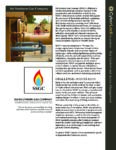Sui Southern Gas Company (SSGC) is Pakistan’s leading integrated gas company engaged in the transmission and distribution of natural gas. SSGC’s transmission system extends throughout the provinces of Balochistan and Sindh, comprising over 3,614 km of high-pressure pipeline. The distribution activities, servicing over 1,200 towns in the Sindh and Balochistan provinces, are managed through its regional offices. Over 350 million cubic feet of gas is sold annually to around 2.8 million industrial, commercial and domestic consumers in these regions. SSGC owns and operates the only gas meter manufacturing plant in the country, having an annual production capacity of 356,000 meters.
SSGC’s mission statement is “To meet the energy requirements of customers through reliable, environment-friendly and sustainable supply of natural gas, while conducting business professionally, efficiently, ethically, and with responsibility to all our stakeholders, community, and the nation.” With such a vast quantity of natural gas to control, monitor and distribute, SSGC required an intelligent access control solution to replace 20-year-old padlocks securing their gas meter stations. These stations house sensitive equipment such as gas meters, electronic volume correctors, and remote monitoring equipment.
Challenge: Master Keys
Each of the old padlocks could be accessed with a single master key, which enabled the crew to open all locks without authorization. With multiple master keys in circulation, SSGC was prone to unauthorized access to the gas meter stations. This allowed unauthorized key holders to tamper with equipment, making changes to reflect a lower gas usage reading and restrict live monitoring of billing information.
Without ownership of the system or the ability to track master keys in circulation, SSGC was recovering duplicate master keys in the hands of people not even associated with SSGC. Witnessing the mismanagement of padlocks and keys, as well as the inferior quality and outdated technology, the senior management of SSGC decided to introduce the CyberLock system to protect the sensitive and costly gas equipment, and more importantly, to avoid the huge losses resulting from gas meter station tampering.
To protect SSGC’s assets, it was unanimously agreed to implement the CyberLock system.
Solution: CyberLock
With CyberLock, Sui Southern Gas Company was able to eliminate the unauthorized access to sensitive gas meter stations. Further, SSGC is able to give access rights for: meter readers to obtain monthly billing reads, measurement teams for fixing any mechanical or technical issues, surveillance and monitoring teams to check the overall condition of the facility, as well as any other individuals or groups who require access to sensitive assets.
SSGC utilizes Cyberlock’s reporting system, which was not available in their original access control system. This feature allows SSGC to monitor every access attempt to improve accountability. Additionally, SSGC is able to cross-match the CyberLock data with their Customer Care and Billing System to track all attempted lock openings. This means the opening of any CyberLock installed at gas meter stations will have a specific field activity created in the Customer Care and Billing System, validating the reason for opening the lock. Any unmatched entries which do not correspond to a key opening event are highlighted with the respective department(s). In short, each time the lock is opened, it is being verified with the corresponding entry in the Customer Care & Billing system.
SSGC has even segmented the authorization of CyberKey smart keys with respect to distinct regions within the franchise territory; meaning one region is not authorized to open locks pertaining to other regions. This has given SSGC absolute control of access to its most critical assets.
With CyberLock, Sui Southern has increased personnel accountability, reduced shrinkage costs, and maximized efficiency of its service technicians and contractors. And best of all, SSGC was able to implement intelligent access control at all its remote sites without the cost of hard-wiring or network expansion.


